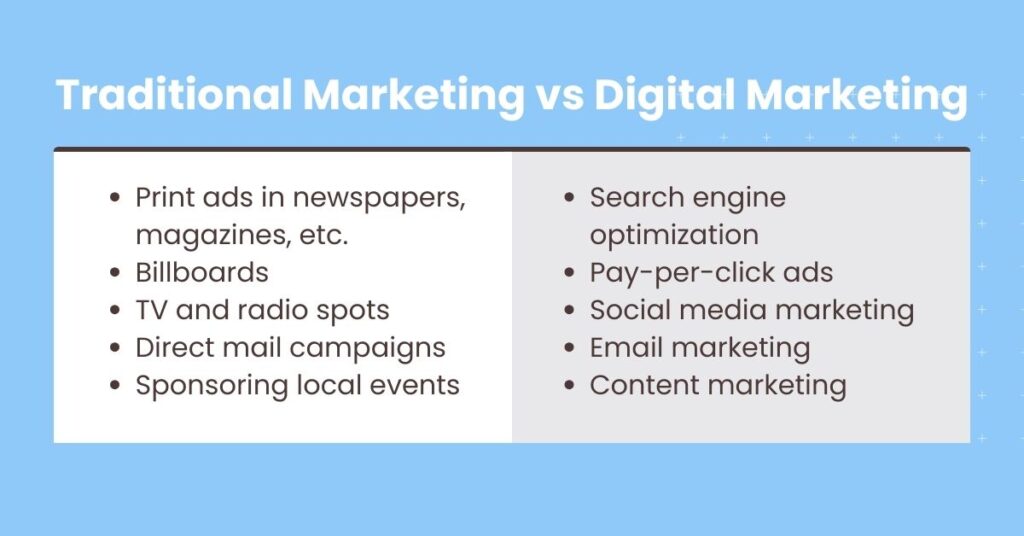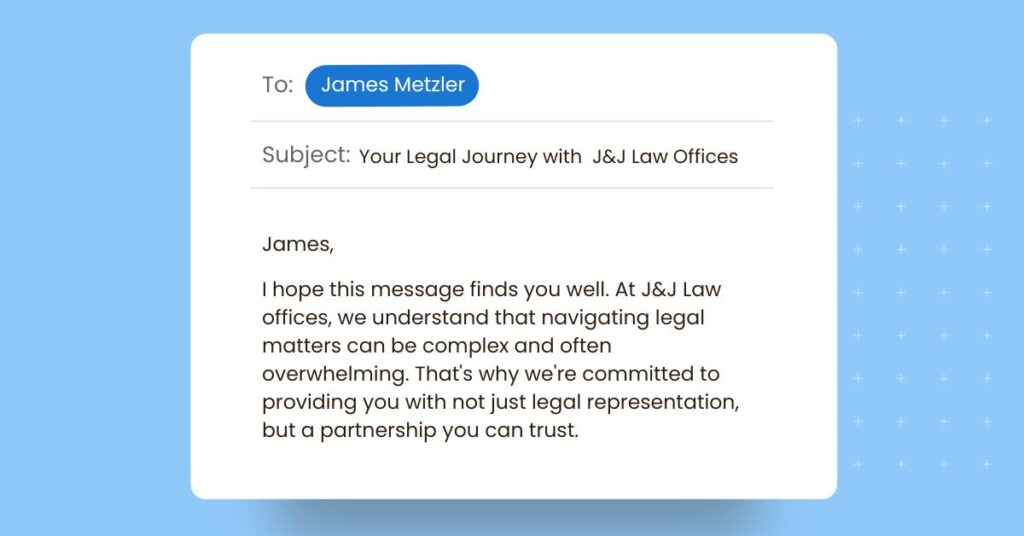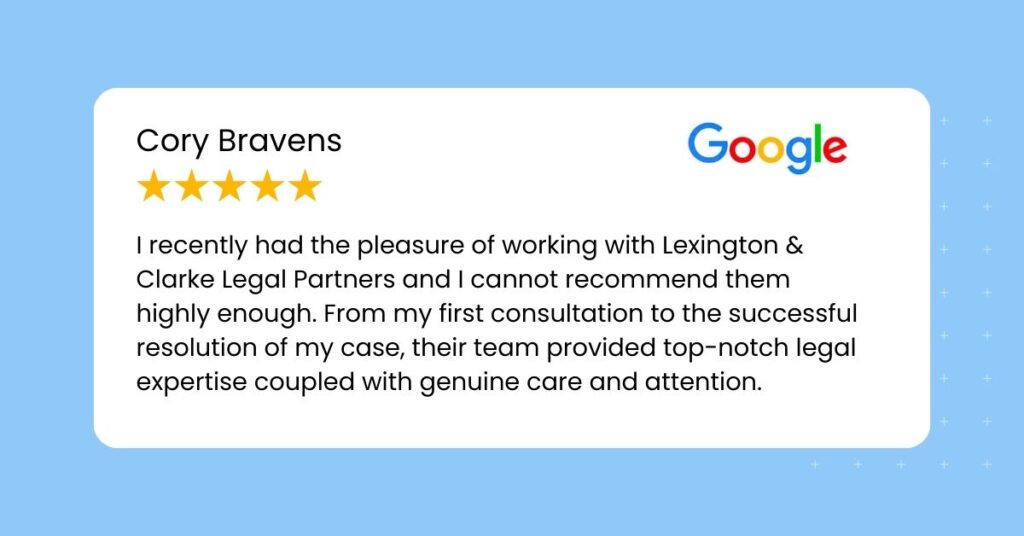Lawyers are experts at advocating for their clients, but when it comes to advocating for their firms, many find themselves in unfamiliar territory.
You can lean on understanding the law and legal precedents to guide you in the courtroom. But law firm marketing requires different skills — brand building, digital savviness, and a deep understanding of client needs and perceptions.
If you’re new to the world of law firm marketing, we’ve got you covered. In this article, we’re sharing a step-by-step guide to successfully marketing your firm.
Table of contents
- Traditional vs. digital marketing for law firms
- How to do marketing for a law firm: A step-by-step guide
- 1. Identify your target audience
- 2. Conduct a competitive analysis
- 3. Put together a plan
- 4. Conduct keyword research
- 5. Optimize your website for SEO
- 6. Create high-quality content
- 7. Leverage social media
- 8. Use email marketing
- 9. Try PPC advertising
- 10. Network and build partnerships
- 11. Encourage referrals
- 12. Consider hosting webinars and workshops
- 13. Claim listings and leverage directories
- 14. Encourage client reviews
- 15. Make it easy to contact you
- 16. Monitor and adapt your strategies
- Should I work with a digital marketing agency for law firms?
- Law firm marketing FAQs
- Empower your practice with Birdeye
Traditional vs. digital marketing for law firms
When it comes to law firm marketing, you have two main options: traditional marketing and digital marketing. Both approaches have pros and cons, so let’s break them down.

Traditional marketing for law firms typically leverages the following channels:
- Print ads in newspapers, magazines, etc.
- Billboards
- TV and radio spots
- Direct mail campaigns
- Sponsoring local events
The advantage of traditional marketing is that it can help build broad awareness through channels many people still use. However, it can be challenging to target your messaging and track results. There is also often a substantial upfront cost involved.
Digital marketing for law firms includes a combination of strategies like:
- Search engine optimization
- Pay-per-click ads
- Social media marketing
- Email marketing
- Content marketing
Digital marketing allows much more precise targeting and measurable results. You can laser-focus your efforts on reaching potential clients actively searching for legal services online. However, it does require some expertise in online platforms and constant optimization.
Most law firms find that an integrated approach works best. Traditional marketing builds general awareness, while digital marketing generates qualified leads. Used together, they provide reach through multiple channels tailored to how people research legal services today. The key is finding the right mix for your specific firm.
In this article, we’ll focus primarily on online marketing for law firms, but we’ll touch on a couple of non-digital tactics as well.
Birdeye – all-in-one platform
Need help with law firm marketing? See what Birdeye can do for your firm.
How to do marketing for a law firm: A step-by-step guide
Now that you know the basics, we’ll walk you through the steps you should take to market your law firm.
1. Identify your target audience
The first step is getting clear on who you want to serve — as the saying goes, you can’t be everything to everyone. Defining your ideal clientele enables you to craft messaging that resonates and guides your outreach through the proper channels.
You’ll want to consider factors like:
- Location: Do you serve clients only in your city, or do you serve a broader region?
- Age: Are you targeting millennials, families, or retirees?
- Profession: Do you specialize in helping specific industries like medicine or tech?
- Income level: What price services can your audience afford?
- Family status: Are you targeting newly married couples? Single parents?
- Legal needs: Do you specialize in areas like divorce law, criminal law, startup law, or something else?
Dig deep. Get ultra-specific on the profiles of prospects likely to become clients. This allows for more personalized and effective communication. For example, your ideal target audience could be:
- Upper-middle-class families in the Phoenix metro area with school-aged children who need help with estate planning and drafting wills.
Or:
- Mid-sized dental practices in the Northeast looking for an attorney to review contracts and provide general counsel.
The more narrowly you can define your ideal client, the better.
2. Conduct a competitive analysis
Often, to be the best, you have to beat the best. Research how competing firms brand and market themselves. Analyze their websites, thought leadership content, advertising campaigns, events, areas of specialty, and more. You should know your competitors like the back of your hand.
This competitive analysis provides tremendous insight into how others position themselves, key messaging used, outreach channels and campaigns, and opportunities for you to differentiate.
For example, take note if multiple competitors invest heavily in Google Ads. If all of your competitors are doing it, it might work for your firm, too.
Similarly, if you notice that very few law firms target a specific need or audience, you may be able to fill that gap.
Closely evaluating the competitive landscape equips you to carve out your niche, refine your strategy, and highlight your unique strengths.
3. Put together a plan
Once you’ve identified your audience and competitors, you can map out a comprehensive marketing plan.
Your marketing strategy documentation should outline specifics like:
- Your core brand messaging and positioning
- The platforms, channels, and tactics you’ll use to reach prospects
- Content creation strategy, such as blog posts and thought leadership
- Ad campaigns, both digital and traditional
- Website optimization plan
- Social media strategy
- Email nurturing campaigns
- Events, sponsorships, and partnerships
Documenting your marketing plan makes your efforts strategic rather than scattershot. It also enables you to monitor results and continuously optimize what’s working.
And remember, your marketing plan should be agile. As you test different strategies, double down on what proves most effective. Be willing to kill off tactics that don’t get results.
4. Conduct keyword research
An essential component of your marketing plan is keyword research, which will help guide your content and local SEO efforts.
To conduct keyword research, identify the precise terms and phrases your audience uses when seeking legal assistance. This allows you to optimize content with the right keywords to get found in search engines and reach prospects who are actively looking for your services.
For example, a divorce attorney may want to target keywords like:
- “divorce lawyer near me”
- “child custody lawyer Dallas”
- “family law attorney Austin”

Meanwhile, a startup lawyer might research keywords such as:
- “startup legal help”
- “venture capital contracts”
- “SaaS lawyer”
Once you’ve identified some potential keywords to target, using tools like Google Keyword Planner, SEMrush, or Ahrefs allows you to gauge the popularity and competitiveness of keywords. This will give you an idea of how hard it will be to rank for your keywords.
5. Optimize your website for SEO
Your law firm’s website is often the first interaction between you and prospective clients. That’s why search engine optimization (SEO) is a top law firm marketing strategy, and should always be a priority.
Follow technical best practices like site speed optimization, implementing schema markup, and seamless mobile responsiveness. For these kinds of tasks, you might need to hire an expert.
On the more straightforward side of things, incorporate targeted keywords throughout your site pages and content.
Your practice area pages should include local keywords that potential clients may search for, like “employment lawyer Austin” or “personal injury attorney Miami.”
Your homepage and other landing pages should speak directly to these potential searchers. Make it abundantly clear your firm has the expertise, experience, and resources to meet their specific legal needs. Calls-to-action to contact your firm for an initial case review should be prominent and easy to find.
By optimizing your website for SEO, you’ll rank higher in search results and appear when consumers search for legal assistance aligned with your capabilities.
6. Create high-quality content
Good content is an incredibly effective way to capture attention and drive decisions — that’s why 82% of marketers actively invest in content marketing.
Creating high-quality content has multiple advantages:
- It builds credibility and trust in your expertise
- Incorporating target keywords improves website traffic and leads
- Content promotion expands reach to new audiences
- Published pieces become assets that attract business over time
So, where should you start? First, consistently publish content around topics that resonate with your ideal clients. This may include:
- Informative blog articles on relevant legal issues
- Detailed legal guides and ebooks
- Bio pages showcasing your credentials and experience
- Explanatory videos demystifying complex regulations
- Podcasts discussing need-to-know topics

But simply publishing content isn’t enough. You need to distribute that content through email, social media, and possibly paid promotions to get it in front of the right people.
Remember that ongoing optimization based on performance is crucial to effective online marketing for law firms. To maximize your efforts, double down on content formats and topics that gain traction and update old content regularly.
7. Leverage social media
Maintaining an active presence on platforms like Facebook, LinkedIn, Twitter, Instagram, and YouTube provides a glimpse into your firm’s personality and work.
Share a steady stream of updates showcasing your team, client wins, community involvement and pro bono work, firm news and announcements, industry recognition and awards, and other content published on your website and blog.
You should also use social media to facilitate conversations and connections with current and potential clients. Be responsive to comments, messages, and engagement from the community.
8. Use email marketing
Email presents an opportunity to reach a massive audience — 4 billion people use email daily. When done correctly, professional email campaigns achieve several objectives, including:
- Building deeper connections with existing clients through regular touchpoints and value-added content
- Staying top-of-mind with prospective clients in the awareness or consideration phase, nudging them closer to hiring your firm
- Promoting specific content offers, events, or special incentives to drive action
- Re-engaging past clients who may require additional legal services in the future
- Directing visitors from other marketing channels (social media ads, search engine results, etc.) to convert through your website

Of course, annoying and overly promotional emails can have the opposite effect, so craft relevant, valuable messages for specific audience segments.
9. Try PPC advertising
Pay-per-click (PPC) advertising on platforms like Google Ads can complement your organic visibility. PPC ads appear alongside regular search results. You pay only when someone clicks your ad.
The key to success with this strategy is starting with a small, defined budget and campaign, tracking returns, and expanding PPC investment incrementally as the data supports.
10. Network and build partnerships
While it’s not a digital marketing tactic, this one is worth mentioning. Networking with professional associations, nonprofits, chambers of commerce, and other local organizations expands your network and can even improve the quality of your service.
For example, an estate planning attorney may want to develop ties with financial advisors who could refer clients needing wills and trusts.
Look for speaking and sponsorship opportunities with groups aligned with your expertise, and provide value by genuinely getting to know fellow members. As you do this, awareness of your firm will increase, and you’ll establish yourself as a credible and trusted expert in your field.

11. Encourage referrals
Our data shows that referrals from friends and family are the most trusted resources for evaluating reputation, and reputation is everything in the legal industry. Yet many firms leave generating referrals primarily to chance rather than taking a proactive approach.
Some best practices include:
- Educating clients on the types of legal needs, cases, and clients you take on. This allows them to keep you in mind if a situation where your services might be of use arises.
- Making it easy for satisfied clients to refer friends and family by providing pre-filled contact cards or online referral forms.
- Offering referral rewards or discounts as incentives to motivate happy clients to spread the word.
- Following up a referral that converts to a new client with a handwritten thank you note or small gift to the existing client who provided the introduction.
The legal space is built so heavily on reputation and relationships, so prioritizing client referrals pays dividends.
12. Consider hosting webinars and workshops
Hosting online or in-person continuing education events establishes credibility and provides immense value to existing and potential clients. Consider hosting webinars, seminars, or workshops covering legal issues relevant to your specialties and target audience.
A family law attorney may present a webinar on the impacts of divorce on estate planning. Or a personal injury firm could lead a workshop on what to expect throughout the claims process after an auto accident.
Once planned, promote these events through your website, email marketing, and social media. And be sure to record the events so you can repurpose the content later on.
13. Claim listings and leverage directories
One of the best law firm marketing strategies is ensuring your law firm shows up accurately across key online listings and directories. It makes you more discoverable. This includes:
- Google Business Profile: Optimize your free listing with your name, address, phone number (NAP), photos, FAQs, and more.
- Industry-specific sites: Create profiles on lawyer review sites like Avvo, Martindale-Hubbell, and Lawyers.com.
Check your listings regularly to verify your NAP details are correct. Inaccurate information hurts local SEO visibility.
Pro tip: Updating listings and directories manually can be tedious. Instead, manage all of your listings from one convenient dashboard with Birdeye.
14. Encourage client reviews
Another one of the most effective ways to market a law firm is with online reviews.
People check online reviews before engaging with a local business 68% of the time. There’s no arguing it: Reviews significantly influence client decisions. Your approach to review management can make or break your firm.
Make reviewing your firm quick and easy for clients. Survey them post-case to gauge satisfaction. Then, ask if they’d be willing to share their experience publicly.
Focus on review generation on Google, Facebook, and legal-specific sites. Once the feedback starts rolling in, respond to it. Make a goal to respond to all of your reviews — the good, the bad, and the ugly — as doing so shows clients and prospects that you care deeply about their experience with your firm.

→ Empire Legal generated 1234 new reviews in just 12 months with Birdeye. Read the case study to learn how they did it.
15. Make it easy to contact you
Attracting prospective clients is a must, but making it easy for people to connect with your firm is equally important. The easier you make it for website visitors and searchers to contact you, the more likely they will move forward as clients.
Consider adding features like:
- A chatbot on your website to answer basic questions and guide prospects to the right information or person.
- A call button on your Google Business Profile that enables mobile searchers to call your firm with one tap.
- An intake form to allow website visitors to request a case review call instantly.
- Proactive live chat or phone follow-up when someone fills out a contact form. Don’t make them wait around.
Try to identify and eliminate any friction in the client journey. The faster you can move a prospect from initial interest to a real conversation with your legal team, the better. Convenience goes a long way in convincing potential clients to hire your firm over competitors.
16. Monitor and adapt your strategies
Law firm marketing isn’t a “set it and forget it” thing. You need to analyze performance and refine your approach regularly.
Track metrics like website traffic, inbound leads, online reviews, and new client acquisitions. See what content and campaigns drive results. Identify underperforming efforts to axe. Then, keep iterating until you strike gold.
Should I work with a digital marketing agency for law firms?
Marketing is a big job. Because of that, many lawyers consider working with a specialized digital marketing agency for law firms to handle some or all of their online marketing efforts. What are the pros and cons of this approach?
Potential benefits include:
- Gaining expertise your team may lack
- Saving time by outsourcing tasks
- Accessing proprietary tools and technology the agency provides
The main benefit of hiring an agency is that your staff can focus more on core legal work. However, the costs may be higher than managing marketing in-house. You also lose a bit of control and the ability to pivot quickly.
To make the right choice, vet potential agency partners carefully. Look for legal marketing expertise and ask about past results serving firms like yours. Clearly outline expectations, requirements, metrics, and processes for working together seamlessly.
Working with the right agency provides access to elevated strategies and talent you may not have internally. This partnership model isn’t for every firm, but for many, the benefits of increased visibility and new business outweigh the costs.
Law firm marketing FAQs
To create a marketing strategy for a law firm, start by identifying your target audience and understanding their needs. Research your competitors and establish your unique selling proposition. Develop a comprehensive plan that includes SEO, content marketing, social media, and PPC campaigns. Measure and adjust your strategy based on performance metrics and client feedback.
Examples of legal marketing include developing a professional website that showcases your services, creating informative blog posts about legal topics, using SEO to improve online visibility, engaging with clients on social media platforms, and running targeted PPC campaigns to attract potential clients.
The best digital marketing strategy for law firms combines several tactics, including website optimization, social media marketing, search engine optimization (SEO), and paid digital ads. Successful firms invest in areas that align with their practice areas, firm values, and client needs.
Law firms benefit from professional marketers to navigate the complexities of digital marketing, build brand awareness, and attract more clients. Marketers help law firms by developing effective marketing strategies, managing online reputation, and creating engaging content that resonates with their target audience. If you’re not ready to hire an in-house team, consider partnering with a digital marketing agency for law firms.
Empower your practice with Birdeye
Now that you know the ins and outs of law firm marketing, it’s time to put that newfound knowledge into practice.
With Birdeye, you gain access to a comprehensive suite of features designed to streamline client connections, amplify your online visibility, and effortlessly manage your reputation.
Birdeye is more than just a tool; it’s a gateway to transforming your law firm’s approach to marketing and building client relationships. Don’t wait to see the difference it can make — watch a demo today and learn how to get started.

Originally published


![[Feature image] Competitive intelligence tools- The definitive guide for 2025](https://birdeye.com/blog/wp-content/uploads/Feature-image-Competitive-intelligence-tools-The-definitive-guide-for-2025-375x195.jpg)



![[Feature image] The best AI tools for business in 2025 A complete guide for productivity, content, and growth](https://birdeye.com/blog/wp-content/uploads/Feature-image-The-best-AI-tools-for-business-in-2025-A-complete-guide-for-productivity-content-and-growth-375x195.jpg)


